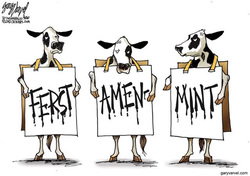
Deeper questions on the extent of overlap between use of government symbols vs. use of commercial symbols are more easily answered by remembering that the dominant goal of trademark law is preventing consumer confusion as to source. In the private sector, if confusion about a trademark is likely to result in harm to the consumer from a counterfeit product, stopping others from using the trademark is hugely important. But in the private sector, a trademark owner does not have the unmitigated right to prevent all uses of their trademarks by others, particularly where no confusion is likely and there are greater interests at stake. These greater interests often originate in the interest of competition. Another greater interest is also found in freedom of expression. Trademark law knows these greater interests collectively as the “fair use” defense.
What interests are at stake when the discussion shifts to the public sector and the government’s attempt to stop others from using official symbols? Some of the main arguments seem to center around the government’s beliefs that any kind of use could result in mutilation or alteration of an official seal. Prohibiting this kind of use, I guess, is meant to preserve the official and esteemed nature of the underlying government office. Still another argument from the government is that unauthorized use of official symbols is an impersonation that is (I’m drawing inferences here) designed to prevent other government officials and members of the general public from being duped.

In all instances of parody, the interest to be protected is freedom of expression. As a society, we like to be entertained and what is more entertaining than having a laugh at a prominent company’s expense over a clever play on words? No harm, no foul. If private companies aren’t allowed to wield their trademarks like hegemons of the English language, why should a governmental body be allowed to do the same? An attempt by the government to insulate itself from criticism cannot be paraded around under the guise of trademark law, just like a company cannot shield itself from criticism by asserting its trademarks. Trademark rights can extend pretty far in preventing others from improperly using a mark, but they cannot be complete bars to any use.
So our friend, the maker of the Anti-NSA t-shirts ought to proudly display his wares and sell them. As for his pre-emptive suit against the NSA, a prudent thing for the court to do would be to step back, take note of all interests at stake, and consider whether the government really should be allowed to create a new branch of trademark law.


 RSS Feed
RSS Feed